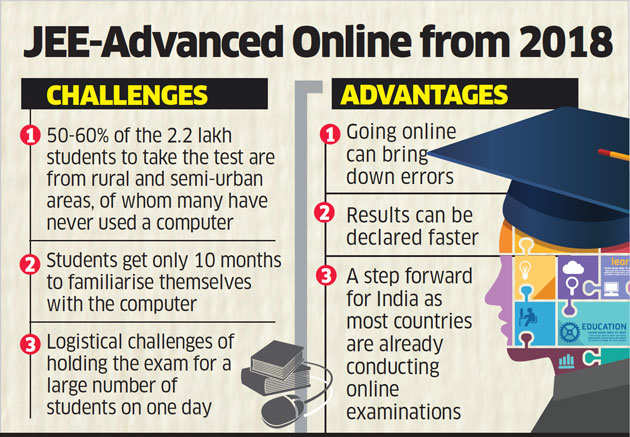Mastering Pythagoras and Bayes’ Theorem may come in handy for a teenager preparing for a berth at the nation’s most prestigious engineering colleges, but means nothing if he doesn’t have a working knowledge of the computer.
Of the 2.2 lakh students appearing for the IITJoint Entrance Examination (Advanced) in 2018, an estimated 50-60% are from rural and semi-urban areas.
Many of these students have never used a computer, said experts and coaching institutes. And these students have just 10 months to get comfortable with the computer before they take online one of the toughest engineering entrance exams in the world.
Last week, the Joint Admission Board (JAB) announced that the entrance test to Indian Institutes of Technology will completely go online from 2018. The last written IIT JEE-Advanced was held in May this year.
Last year’s JEE-Mains, a preliminary exam to the JEE-Advanced, was conducted both offline and online. According to expert estimates, just 5-10% students opted then to take the test online.
“Several students are from remote rural villages. Many of them cannot log in to a computer or do not even have an email account. They might be good in mathematics and science but do not have knowledge of or access to computer. They will be hit by this decision,” said Gaurav Yadav, academic counsellor at Bansal Classes, one of the top coaching institutes in Rajasthan’s Kota district.
“I feel it is against the interest of students. Even students who have seen computer might not be comfortable enough to write such as tough exam on computer overnight,” said Pramod Maheshwari, chief managing director, Career Point.
Only 20-25% of students being coached at Aakash Institute for Engineering, including its centres in Kota, have direct access and a device (laptop or desktop), director Aakash Chaudhry said.
The IIT JEE is the qualifying examination for candidates seeking admission to undergraduate engineering programmes at IITs and other centrally funded technical institutions. The tests are conducted in two parts, JEEMain and JEE-Advanced (the sole admission test for the IITs).
Coaching institutes in Kota, including the Bansal Classes, Vibrant Academy and Career Point are gearing up to make their students comfortable taking the tests online. Several of them already have their digital platforms and will start familiarising the students to it.
“All coaching institutes have online testing platforms — at least for JEE-Mains, which they will transfer for JEE-Advanced,” said Rakesh Sharma, senior manager at Vibrant Academy. However, the students who have taken admission in April-June are at the peak of their preparation for the tests and do not have much time to familiarise themselves with the new system.

Another challenge could be managing over 2 lakh students taking the test online on one day. However, Bhaskar Ramamurthi, director of IIT Madras and chairman of JAB 2017, ruled out the possibility of conducting multiple exams.
“The reason we had not started it earlier is because we felt it is not possible to manage the over 2 lakh students together online but now we know it is feasible,” he said, adding that online tests are being already done in other exams like GATE. “We will release more information on how students can familiarise themselves and sample papers, etc.,” he added.
However, unlike IIT JEE that is for Class 12 students, GATE is conducted for admissions to postgraduate courses in engineering/technology/architecture/science, where there is more scope of an earlier exposure and familiarity with computer.
Similarly, the Common Admission Test (CAT), an entrance examination to the premier management and business schools like IIMs, is also a computer-based test. However, CAT applicants are at least graduates who are more likely to have basic knowledge of the computer than the young 18-year-olds from rural hinterlands.
But there are advantages too of conducting the test online. Going online can bring down the errors that had embarrassed the IITs in the recent past with the Supreme Court issuing a stay order on the admission process at all IITs. Also, results can be declared faster and it could be logistically easier.
“Taking the entrance online is a step forward for India as most countries are already conducting online examinations,” said Anindya Mallick, partner, Deloitte Touche Tohmatsu India.
“Last year’s paper had huge translational and printing errors. Going online will certainly help reduce this,” said RL Trikha, director of the coaching institute Forum for Indian Institute of Technology and Joint Entrance Examination.
However, when computer is not even a compulsory subject in CBSE Class 12 examination, some experts said conducting a crucial examination like the JEE-Advanced online with just 10 months for the students to get comfortable with the machine could prove to be a tough decision.
Read More...